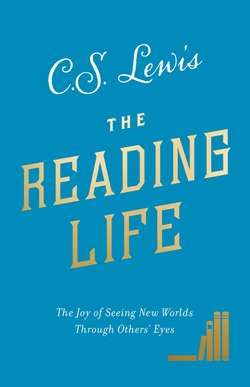Читать книгу The Reading Life: The Joy of Seeing New Worlds Through Others’ Eyes - Клайв Льюис, Клайв Стейплз Льюис, C. S. Lewis - Страница 6
PREFACE
ОглавлениеTHE NOTED CRITIC WILLIAM EMPSON ONCE DESCRIBED C. S. Lewis as “the best-read man of his generation, one who read everything and remembered everything he read.”[1] This sounds like pardonable exaggeration, but it comes close to being true in the realms of literature, philosophy, and classics. At the age of ten, Lewis started reading Milton’s Paradise Lost. By age eleven, he began his lifelong habit of seasoning his letters with quotations from the Bible and Shakespeare. In his mid-teens, Lewis was reading classic and contemporary works in Greek, Latin, French, German, and Italian.
And Lewis did indeed seem to remember most of what he read. One of his students recalled that someone could quote any line from the book-length Paradise Lost, and Lewis would continue the passage from memory. Another student said that he could take a book off Lewis’s shelf, open a page at random and begin reading, and Lewis could summarize the rest of the page, often word for word.[2] With that kind of memory, Lewis had little difficulty reaching for just the right quotation or reference to illustrate his point. Since it seems he was able to carry an entire library in his head, it should come as no surprise that his major scholarly books average about one thousand citations apiece. His three volumes of letters contain another twelve thousand quotations or references. Even The Chronicles of Narnia for children contain nearly one hundred echoes or allusions to myth, history, or literature.
But as Mortimer Adler once remarked, “In the case of good books, the point is not to see how many of them you can get through, but rather how many can get through to you.” Lewis would certainly agree, and he often commented how much his worldview and sensibility were shaped by the books he read—everything from Beatrix Potter in childhood to his re-reading of Homer’s Iliad, Dickens’s Bleak House, and Tennyson’s In Memoriam in the last few weeks before his death in November 1963.
Lewis was a disciplined reader and an engaged reader. Fellow scholars recall how he could sit for hours in the Bodleian Library at Oxford, perusing and absorbing texts, oblivious to what was happening in the room around him. When reading books from his private library, he often added marginal notes and created his own index on the inside cover. If he found a book unprofitable, as he did Byron’s Don Juan, he simply wrote on the inside back cover “Never again.”
Of course, reading was also one of the supreme pleasures of Lewis’s life. In his memoir Surprised by Joy Lewis described his ideal daily routine to be reading and writing from nine until one and again from five to seven, with breaks for meals, walking, or tea-time. Apart from those six hours of study every day, he also enjoyed light reading over meals or in the evening hours (pp. 141–143). All in all, Lewis’s preferred schedule seemed to include seven or eight hours of reading per day! For Lewis, reading was both a high calling and an endless source of satisfaction. In fact, his sense of vocation and avocation were virtually indistinguishable whenever he picked up a book—and often when he wrote one.
Often Lewis described the community that is formed when one is among fellow passionate readers (see the chapter on “How to Know If You Are a True Reader”). This fellowship is not one of merely sharing a hobby but of people whose worlds have been enlarged and deepened by books. They are a distinctive group. This collection brings together fun, whimsical, and wise selections from Lewis’s lifetime of writing that would be of interest to those who share this passion. And we mean all who love reading literature, whether children’s fantasy, poetry, science fiction, or Jane Austen. We did not include his opinions on classic or historical literature, which was his academic specialty, but only his advice and opinions on the shared enterprise of reading works of general interest. Nor do we include his many comments on Christian or devotional reading. This book is for members of the reading club, broadly defined.
One of the delights of Lewis’s thoughts on reading is the breadth of his passions, never forgetting the childhood joy in discovering that books were portals to other worlds. As Lewis himself explained, “Literary experience heals the wound, without undermining the privilege, of individuality … In reading great literature I become a thousand men and yet remain myself. Like the night sky in the Greek poem, I see with a myriad eyes, but it is still I who see. Here, as in worship, in love, in moral action, and in knowing, I transcend myself; and am never more myself than when I do.”
This volume is for the entertainment and the edification of those in this reading club. We hope you enjoy this new window into the wit and wisdom of C. S. Lewis.
DAVID C. DOWNING
Codirector of the Marion E. Wade Center at Wheaton College in Illinois
MICHAEL G. MAUDLIN
Senior Vice President and Executive Editor, HarperOne
